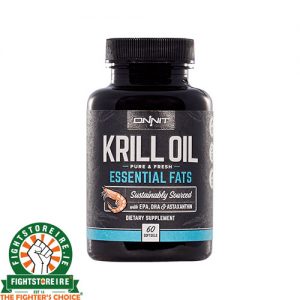Description
Krill Oil
Onnit’s krill oil is sustainably harvested from pristine Antarctic waters, and is tested to be free of toxic heavy metals that are becoming an increasing problem in other seafood based food and supplementation. To learn more about the collection methods from our supplier, click the video below. Krill Oil also has several benefits over fish oil that make it a superior choice in supplementation.
Krill Oil Research
- Krill Oil vs. Fish Oil
Omega-3 fatty acids are essential dietary components that play a key role in development and maintenance in a variety of organ systems. Fish oil contains eicosapentaenoic acid (EPA) and docosahexaenoic acid (DHA), two long-chain polyunsaturated fatty acids (PUFAs) that cannot be synthesized by humans. A large body of research has revealed the enormous benefits of these fats, ranging from enhancing cognitive function to fighting obesity. Recent research has focused on which source of fatty acids reigns as superior and the answer is clear: krill is king. - What’s the difference?
- The Source
If you’ve never heard of krill, you might not be alone. However, at an estimated 600 million tons, the biomass of these shrimp-like crustaceans more than double the biomass of human beings. The harvesting practices of krill for human consumption are tightly regulated and make a minimal impact on total krill population. Comparatively, the use of krill as a nutrient source is more sustainable than other types of fish oil, such as cod or salmon. - Bioavailability
Both krill oil and fish oil contain EPA and DHA. However, the one key disparity is the content of phosphatidylcholine (PC) in krill oil. The addition of a phosphate group to the fatty acid chain permits simpler digestion in the small intestine and a more rapid incorporation into brain, lung, and liver tissues. When comparing the effects of the EPA bound to phosphatidylcholine/phosphatidylserine in krill oil as opposed to the EPA bound to triglycerides in fish oil this study demonstrates that krill is more bioavailable. In the aforementioned study, humans that were given krill oil containing 62.8% of the total amount of omega-3s in fish oil, increased their plasma EPA and DHA levels to the same level as those in the fish oil group… despite that it was a smaller dose (by 37.2%). The presence of phospholipids in krill oil are responsible for the increased absorption efficiency and may permit a more rapid incorporation into important tissue [source]. - Astaxanthin Advantage
Krill also contains astaxanthin, the same antioxidant that is responsible for the red color of salmon meat [source]. Astaxanthin is a carotenoid, and carotenoids are antioxidants that sequester singlet oxygen. Singlet oxygen is very reactive and can damage lipid membranes, DNA, and proteins in your cells. All of these are fundamental biological causes of aging. Astaxanthin helps to protect the fatty acid chains from degradation and has been shown to play an important role in reducing inflammation in the cardiovascular system [source]. In a small clinical trial, astaxanthin supplementation itself (e.g. not in combination with omega-3 from krill) was shown to improve immune function while decreasing inflammation (CRP) and lowering DNA damage. Astaxanthin has also been shown to help increase HDL-cholesterol (which was recently shown to help the body strip plaque off of arterial walls) as well as decrease triglycerides in another clinical trial, suggesting it plays an important role in cardiovascular health. - Health & Cognition
Where does krill display its prowess in the world of supplements? The anti-inflammatory properties of krill oil have been shown to assist in healthy weight management by reducing low-density lipoproteins (LDL), commonly known as the harmful type of cholesterol [source]. The incorporation of krill oil can help the body promote weight loss, healthy blood pressure, and affect a reduction in inflammatory problems. Recent research suggests Krill Oil may have a profound effect on the brain, similar to fish oil. One advantage it has in this area is that omega-3 fatty acids incorporated in phosphatidylcholine act on brain function more efficiently than those incorporated in triglycerides, which omega-3s are bound to in fish oil. Since the omega-3 fatty acids are bound to phosphatidylcholine in krill oil, this implies that they will be taken up by the brain tissues more readily than triglyceride-bound omega-3 from fish oil. This infers that it might be able to get positive effects at a lower dose, which is reinforced by the above study on bioavailability.
A clinical trial involving elderly men that supplemented with krill oil resulted in enhanced working memory function. In addition, the krill oil also caused a significant decrease in latency, which reflects the rate of information processing. - Supercharge Your Fatty Acids
The presence of PC in krill is one clear advantage over regular fish oil. However, either fish oil or krill can be combined with additional PC to enhance absorption and boost choline levels. In randomized clinical trials, this combination has been shown to help reduce cortisol levels in individuals with stress [source]. Additional studies combining EPA, DHA, and PC showed elevated levels of attention, mood, and memory function [source, source].
- The Source
Krill Oil Suggested Use:
For adults, take a serving of 1-2 gelcaps twice daily, preferably with food.
Do not exceed the daily serving within a 24 hour period unless authorized by a health care practitioner.
Check out our full range of Onnit products.
These statements have not been evaluated by the Food and Drug Administration. This product is not intended to diagnose, treat, cure, or prevent any disease.
Allergen statement: This product contains shellfish.
What do you think of the Krill Oil from Onnit?
You must be logged in to post a review.










Reviews
There are no reviews yet.